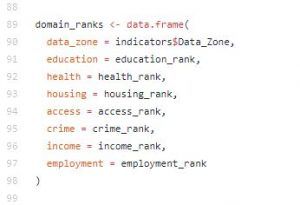About SIMD
The Scottish Index of Multiple Deprivation (SIMD) is a tool produced by the Scottish Government to improve understanding of poverty at the community level and inform the targeting of regeneration investments.
The SIMD tracks 38 data points in income, health, housing and other socio-economic areas for around 7000 small areas across Scotland. The tool, updated most recently in August 2016, enables easy identification of the ‘most deprived’ areas in a given city, town or region.
The SIMD is generally valued and well-used in the SURF network. As noted, however, in a number of our events, such as an Open Forum on ‘What Do We Know About Poverty?’ in 2009, some regeneration practitioners have been calling on the Scottish Government to provide better access to SIMD data beyond the release of results every three or four years.
Open Access

The code behind SIMD has been made available for download
This summer, the Scottish Government has teamed up with industrial research initiative The Data Lab to provide open public access to the algorithm and data that comprises SIMD.
The ‘openSIMD’ project makes available the data, documentation, and code in the statistical programming language ‘R’. These resources can be used by anyone who wishes to understand how SIMD is calculated, produce their own index by excluding indicators or adjusting weightings, or combine with other datasets.
The openSIMD project launched in late May, and a number of organisations, including the Glasgow Disability Alliance, have already used the openSIMD resources to undertake new analyses. Their Chief Executive, Tessa Burke, told the Scotsman at the weekend that:
“The analysis we have been able to undertake has informed our delivery of support significantly as we can now better understand what we knew anecdotally from members: that other factors such as education, employment and health affect disabled people and create multiple challenges to be overcome.”
The openSIMD resources are available on the Scottish Government’s website at the following link:
http://www.gov.scot/Topics/Statistics/SIMD/analysis/openSIMD
Negatives and Positives
A related SURF development concerns objections about the way SIMD findings tend to be presented by the media, which generally focuses on the top ten ‘most deprived’ areas. Such coverage and negative publicity of these communities can damage their regeneration prospects.
In response, SURF is piloting an initiative called SURF’s Index of Multiple Assets and Aspirations, or SIMAA, which is designed to enable ‘most deprived’ communities to present the positive aspects of their lives and local assets that are not captured by SIMD. You can read more about the SIMAA pilot here.
